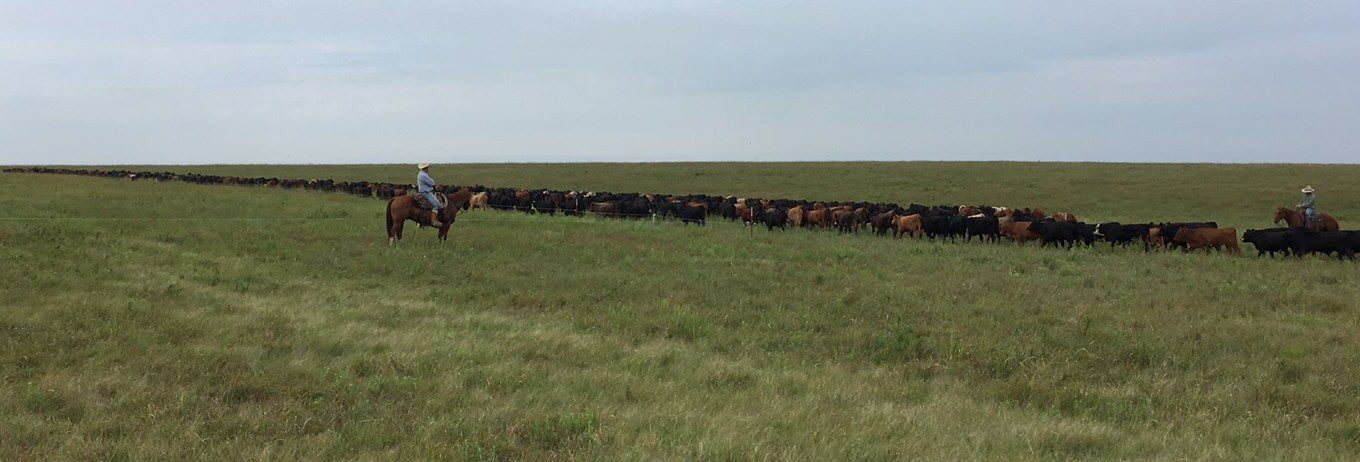Employee Driven
Cattle are certainly the focus of Sooner Cattle Company, Pawhuska, Oklahoma, but an important contributor to the ranch’s success are its amazing employees. Ranch manager Tyson Johnson says being involved in WRCA is an extension of that, as it not only provides cowboys a place to show off their skills and have fun, but also gives back to those involved.
Ten full-time employees, along with day help during busy times, work on the sprawling ranch located in the tallgrass prairie of southern Kansas and Osage County in northern Oklahoma. It’s right on the southern edge of the Flint Hills.
Johnson describes Sooner as mostly a stocker operation. The ranch receives calves from an affiliated ranch out of Florida, backgrounds them, and then either sends them on to the feedyard or grows them on grass. The ranch also has two cow herds, one spring-calving and one fall-calving. The majority of the fall-calving cows are received from a Nebraska ranch as opens and rebred for fall calves.
Being a good steward of the grassland is critical, and that’s a job he doesn’t take lightly, Johnson says. “We work hard to manage the resources accordingly; we try to keep the prairie the prairie.”
In order to do that, the ranch is split into camps with a cowboy in charge of each part. That allows them to use a good rotational grazing program,
with plenty of rest and recovery on the native grass, Johnson explains.
Although Sooner Cattle Company is not in the horse business, Johnson says it’s still a horseback operation. “Everything we do is horseback from straightening out all the yearlings to moving cattle during pasture rotation.”
This allows Sooner Cattle Company to pay their cowboys an incentive to use their own horses while working. That also gives them an opportunity to use their job to train, compete and sell horses to their advantage.
“The ranch itself is not in the horse business,” Johnson says, “but it works out well for both of us if the cowboys are good hands and good horsemen. So, we encourage the cowboys to do what they want with their horses and use the ranch to promote them.”
That mentality goes hand in hand with competing in the WRCA. Sooner Cattle Company has had a team for the past five years and Johnson says the cowboys love to compete.
“They enjoy it for the fun and camaraderie, and it’s a good organization, one we’re happy to support,” Johnson says. “It’s good to be a part of an organization that is like-minded, and with people who love what we do every day.”
Competing with the WRCA and supporting employees in other ways is crucial to getting the good help Sooner Cattle Company has, Johnson says. “We spend a lot of time, energy and resources in developing the autonomy to implement some of that education or training that they receive. We want them to develop in their career and have opportunities for growth within the company or without. I feel like if your employees are growing, even though some other companies or ranches may take them as they move on, it’s still a good thing. The worst thing is to have cowboys or employees that nobody else wants. ”
Johnson admits there is some turnover in their operation, but a lot of that comes from other affiliated ranches. “We have quite a bit of opportunity and some cowboys will get promoted or move to another ranch.”
Johnson is an example of that as he has worked for Sooner for about five years, and for several years before that he worked on one of the other affiliated operations. He grew up on a family operation in Arizona/Utah before graduating from the King Ranch Institute for Ranch Management at Texas A&M University Kingsville.
Because of his childhood on a family operation, Johnson says he appreciates the WRCA even more. “I consider it a great honor to be a part of the WRCA. I appreciate all they do, not just from a competition standpoint but also the charitable branches of the organization.” Johnson adds, “Helping cowboys—whether it’s educational or medical resources—is critical to the success of this industry.”
In addition to freelance writing Sara Gugelmeyer and her husband Jeremy, operate cow/calf and stocker operations in Kansas and Texas, as well as a guided hunting operation: Sagebrush Hunts.

